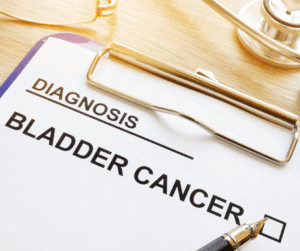Symptoms of Bladder Cancer
 Bladder cancer is a fairly common type of cancer that is often detected early and thus fairly easy to treat and cure, but any type of cancer diagnosis can always feel frightening to the person who is diagnosed and their family members. Most forms of bladder cancers originate in the cells that line the inside of the bladder. These cells mutate their DNA and instead of dying off as they should at a certain point, they live too long and start to multiply, taking over any healthy body tissue in the area. If the mutated cells break away, they can then move to other parts of the body and create cancerous tumors in those areas as well.
Bladder cancer is a fairly common type of cancer that is often detected early and thus fairly easy to treat and cure, but any type of cancer diagnosis can always feel frightening to the person who is diagnosed and their family members. Most forms of bladder cancers originate in the cells that line the inside of the bladder. These cells mutate their DNA and instead of dying off as they should at a certain point, they live too long and start to multiply, taking over any healthy body tissue in the area. If the mutated cells break away, they can then move to other parts of the body and create cancerous tumors in those areas as well.
Symptoms of Bladder Cancer
The most common symptom that gets people to visit their doctor and be examined is blood in the urine. The blood may be bright red or a darker burgundy color. Other symptoms that often coincide with blood in the urine are a need to urinate often, and pain while urinating. Occasionally, the person with bladder cancer will also develop back pain.
Bladder Cancer Risk Factors
While anyone can develop bladder cancer, certain risk factors can increase the probability of your elderly loved one developing the disease.
- Sex. Men are more likely to develop bladder cancer.
- Age. Most bladder cancers aren’t diagnosed until a person is older than 55 years old.
- A Smoking Habit. Smoking tobacco increases the risk of bladder cancer because the harmful chemicals associated with cigarettes, pipes, and cigars accumulate in the bladder as the body tries to process them out of the body.
- Exposure to Certain Chemicals. If your loved one worked in an industry where he was routinely exposed to chemicals used in the manufacture of dyes, rubber, leather, textiles, and paint products, he can have a higher risk of developing the disease.
- Chronic Bladder Infections. Those who have had to use a catheter for a long time, are more likely to develop a form of bladder cancer.
- Having Had Bladder Cancer Before. Bladder cancer is one cancer that can sometimes reappear even long after a person has had treatment and has been declared cancer-free. For this reason, bladder cancer patients must receive routine examinations for the rest of their lives.
Helping Your Loved One During Bladder Cancer Treatment
Your loved one’s doctor will determine the best course of treatment for your loved one. It may include surgery, radiation, chemotherapy, or another form of treatment. Any type of cancer treatment can be debilitating to the person receiving it, and they often need assistance around the home and performing their daily living activities during this time.
If you are unable to stay with your loved one or he cannot stay with you, one way to help him during his treatment is to have a senior home care team visit him regularly to help him with chores around the home as well as some routine personal care activities. A senior home care provider can take care of chores so that your loved one can get the rest he needs as he receives treatment. The provider can also help prepare meals or take care of their pet. With senior home care services, your loved one can focus on himself and not need to worry about his home.

